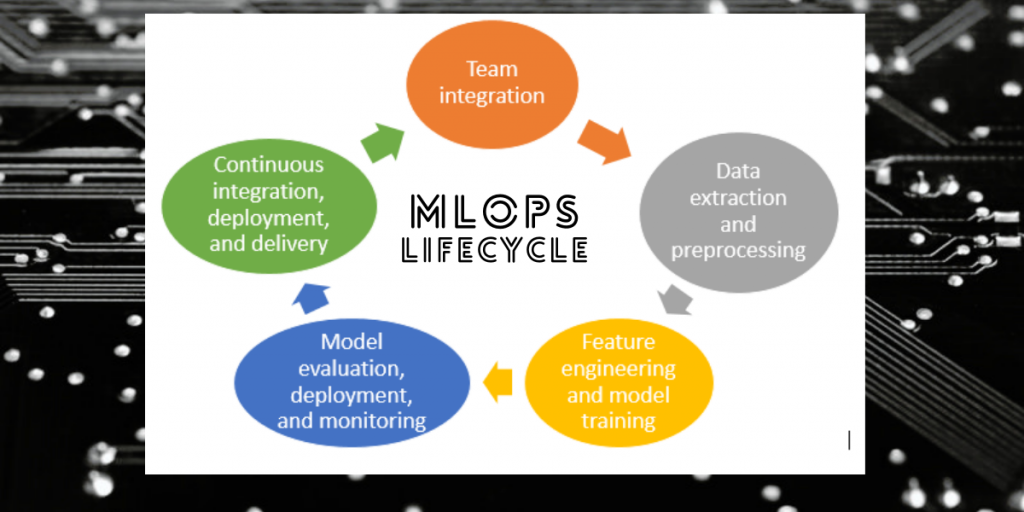Introduction
Businesses should work efficiently and achieve business goals. Businesses can improve their operations with MLOps, MLOps have a tremendous impact on businesses, and businesses can adopt MLOps to improve collaboration and communication in the business. MLOps also helps improve business workflow and faster delivery of products. This article discusses ten benefits of MLOps for businesses and also explains MLOps and its lifecycle.
What is MLOps and the MLOps life cycle?
Machine learning operations (MLOps) is the process that covers the ML lifecycle of a machine learning model starting from data collection and dealing with the collaboration of data scientists, machine learning engineers, and the business operation team. It also deals with the automation of the machine learning pipeline, and the ML model management process. MLOps also uses DevOps concepts like continuous integration and deployment. MLOps lifecycle covers the whole process of building a machine learning model which is explained below.
- Team Integration: MLOps lifecycle starts with integrating the team containing data scientists, machine learning, and DevOps engineers who will collaborate with the business employees and stakeholders.
- Data extraction and preprocessing: This involves the gathering of relevant data from different sources. Data gathered is usually in raw format, so it needs to be converted to useful data.
- Feature engineering and model training: Feature Engineering involves selecting the most relevant variables for training the machine learning model, then model training is performed by application of ML and deep learning algorithms to build concept models. Model hubs are also used to store the trained model and version models which are used in ML production.
- Model evaluation, deployment, and monitoring: after training the ML model, it needs to be evaluated and tested on real-life data, then the deployment of the ML model is done, and continuous monitoring must be ensured.
- Continuous integration, deployment, and delivery: Continuous integration involves automating the whole process of testing and validating the ML models, and ensuring model operations (modelops) and continuous deployment of the integrated codes and continuous delivery of ML models for model operations for your business which makes sure ML models are continuously retrained and automatically updated.

10 benefits of having MLOps for your business
- Automation and quick delivery of ML products for business
Machine learning engineers can use MLOps tools to perform model operations for your business to automate the data entry process and also automate the building process of machine learning models, this results in quick delivery of machine learning models which impacts the business operations and increases business revenue, saves time and resources.
- Promotes collaboration and communication in business
The MLOps life cycle involves the collaboration of both business stakeholders with data scientists and machine learning engineers, which in turn facilitates communication. Tasks are shared amongst collaborators and feedback is provided. This also promotes collaboration and communication.
- MLOps helps to build ML models that provide business insights and forecasts
Machine learning engineers and data scientists help build concept models with important ML features that provide business insights and forecasts during the MLOps lifecycle. During the data analysis and preprocessing stage, the business data is visualized and stakeholders can view the various sectors of the business like the sales rate, and how many goods were purchased in a year and other business-related visualizations. Machine learning models are built to predict the business sales for the next year which helps in business forecasting.
- Real-time analysis
MLOps benefits businesses by providing real-time analysis of how the business data impacts the business operations. MLOps also provide model operations for your business by building machine learning models that adapt to data changes, for example, the business can view how much sales are made in an hour, and this improves the business operations. Anomalies can also be detected in real-time.
- Improved workflow for business
MLOps can help improve business workflow by allowing seamless collaboration of business operation teams and data science teams, it allows for an iterative workflow for the business operations which helps to achieve the desired results. These workflows are dynamic and repeatable.
- Accurate decisions and focused feedback
MLOps help businesses make accurate decisions because during MLOps the machine models developed help make some predictions and also provide business forecasts, therefore, resulting in accurate decisions. Also MLOps can quickly help detect anomalies and also build sentiment analysis models which improve business feedback.
- Helps business understand customer
During MLOps, unsupervised machine learning models are developed with clustering techniques like k-means clustering, and model management is performed, which can help with customer segmentation which is the process of grouping customers with identical characteristics together. This also helps in customer identification and lets businesses understand customers.
- Customer satisfaction
MLOps can help improve customer loyalty, customer experience, and customer satisfaction. This can be achieved based on analysis of previous customer behavior. Therefore customer requirements are easily fulfilled. The machine learning predictions can then help provide customers with the most matching products.
- Improved financial management
Machine learning algorithms developed during MLOps can be used for business financial analytics, such as predicting business expenses and business analysis. This is done through analyzes of historical data. The accuracy of the ML model depends on the quality of data provided, this data can also be useful for fraud detection.
- Increased sales through product recommendation
MLOps can help businesses increase sales margin by the provision of recommender engines developed during the MLOps process and stored in model hubs, these recommender engines help suggest products that match users’ preferences. This can result in increased sales for businesses.
Conclusion
Every business can benefit from MLOps. MLOps helps to improve communication and collaboration in the business, it can also help increase business sales as discussed in this article. Another impact of MLOps on businesses is automation, and establishing good practices. Trustworthy machine learning models used for business operations. Hence it is highly recommended that business adopts MLOps for improved workflow and other benefits.
Related Resources
5 Common Uses Of MLOps In A Business
FAQS
How can my business get started with MLOps?
First, understand the benefits of MLOps in your business, then study the MLOps lifecycle, and get skilled machine learning, DevOps engineers, and data scientists to implement machine learning deployment and monitoring.
How does MLOps fit into business operations?
The team integration in the MLOps process ensures that the data scientists, machine learning, and DevOps engineers collaborate with your business employees, in such a way that the teams work together seamlessly.
What are some Challenges with MLOps?
It can be expensive and require a huge amount of computer power and storage.



